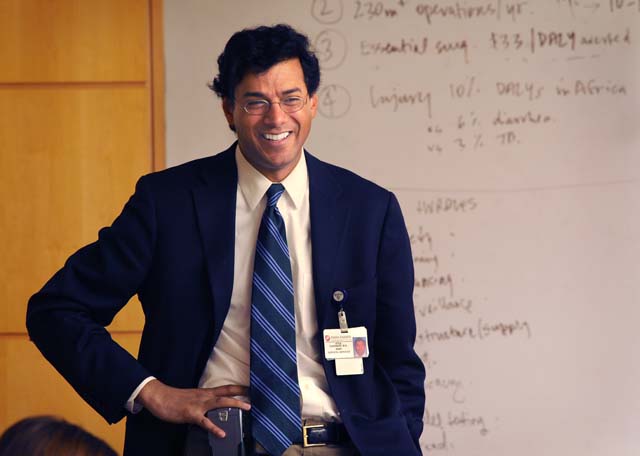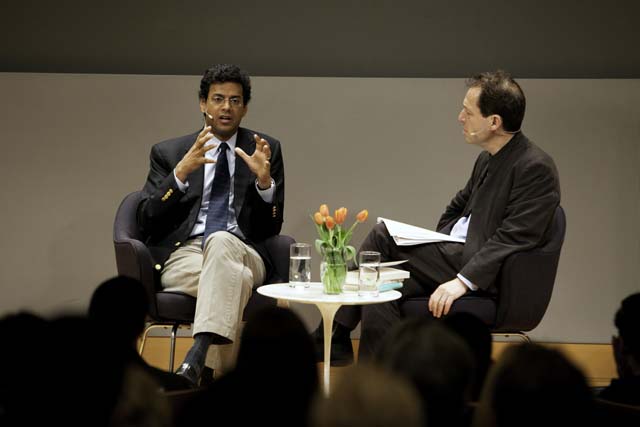June 21, 2018 Update
“Warren Buffett, Jeff Bezos, and Jamie Dimon have found their CEO.
Dr. Atul Gawande has been named CEO of the health care company founded by Berkshire Hathaway (BRK-A, BRK-B), Amazon (AMZN), and JPMorgan (JPM) in an effort to push down health care costs.
Gawande will begin his role at the new company, which will be headquartered in Boston, on July 9. The companies said this new company will operate as an independent entity and will be free from profit-making incentives and constraints.”
Read the full story here

Dr. Atul Gawande: On Improving healthcare…
Dr. Atul Gawande, in today’s lingo, is one cool dude. After all, which other noted surgeon listens to Bruce Springsteen as he performs surgery in the operation theater? As the lanky iconic writer-physician told a room full of fans at the New York Public Library, he’s in surgery twelve to fourteen hours and music helps him and his team get through the day.
“For me music is an important tool for doing that,” he said. “Number one, if I pick the music really well, then the nurses and the anesthesiologists that I want are likely to pick me for my room and I get known a little bit for my playlists, and get certain people I want coming in the door if I pick the music well. You do five cases in a day, it’s a long day. It definitely keeps me going. It’s great!”
Music is just one part of Gawande’s incredibly crowded rich life. Look at his resume and be amazed. He is a general and endocrine surgeon at Brigham and Women’s Hospital, and at the Dana Farber Cancer Institute. He is also Associate Professor of Surgery at Harvard Medical School and Associate Professor in the Department of Health Policy and Management at the Harvard School of Public Health
Wait there’s more – He has published research studies in areas ranging from surgical technique to US military care for the wounded to error and performance in medicine. He is also the Director of the World Health Organization’s Global Challenge for Safer Surgical Care.
And oh, yes, since 1998 he’s been staff writer for The New Yorker magazine. And the author of three critically acclaimed books. In 2006, he received the MacArthur Award for his research and writing. His book Complications: A Surgeon’s Notes On An Imperfect Science was a finalist for the National Book Award in 2002 and is published in more than a hundred countries. His book, Better: A Surgeon’s Notes On Performance was one of Amazon.com’s ten best books of 2007. His newest book, The Checklist Manifesto, is a New York Times bestseller. He also won the 2010 National Magazine Award for Public Interest writing for his New Yorker article, “The Cost Conundrum.”
So powerful is Dr. Atul Gawande’s writing that Charlie Munger, Warren Buffett’s partner, sent him a $20,000 check without ever having met him, after reading ‘The Cost Conundrum’ his piece about healthcare in The New Yorker. Gawande, being Gawande, did not accept the check personally but donated it to Brigham and Women’s Hospital Center for Surgery and Public Health for an international project.
Gawande, who grew up in Ohio, is himself the son of two physicians: his father is an urologist and his mother a pediatrician. He is very much a renaissance man, with diverse interests ranging from music to literature. He received his B.A.S. from Stanford University, M.A. – in politics, philosophy, and economics from Oxford University, M.D. from Harvard Medical School, and M.P.H. from the Harvard School of Public Health. He served as a senior health policy advisor in the Clinton presidential campaign and White House from 1992 to 1993.
In 2006 he received the MacArthur ‘Genius’ Award for his research and writing. He’s written not only for the New Yorker but other publications including the New York Times and Slate. His writings have appeared in the annual Best American Essays and in Best American Science collections.
“I have been trying for some time to understand the source of our greatest difficulties and stresses in medicine,” writes Gawande. “It is not money or government or the threat of malpractice lawsuits or insurance company hassles – although they all play their role. It is the complexity that science has dropped upon us and the enormous strains we are encountering in making good on its promise.”

The Checklist Manifesto: How to Get Things Right
He fights this complexity with simplicity and offers a solution that is startling in its common sense value – the prosaic checklist. In his book, ‘The Checklist Manifesto- How to Get Things Right’, he shares insights on how not only physicians and medical personnel but just about everybody with a project on hand can benefit from implementing this simple tool.
Gawande himself has such a busy and complicated life that it would seem a checklist would be needed to accomplish everything he does! Add to this mix a busy family life in Newton, Massachusetts with his wife Kathleen Hobson and three kids– Walker, Hattie, and Hunter.
Perfecting outcomes has been a passion for Gawande and these are the issues he explored in ‘Complications’ and ‘Better: A surgeon’s notes on Performance’ which was a New York Times bestseller and one of Amazon.com’s ten best books of 2007. As Time magazine described it, “Gawande is a writer with a scalpel pen and an X-ray eye. Diagnosis: riveting.”
In his latest book, he delves deep into the problem of failure even as we have ever more sophistication in training and high technology. As he points out, studies show that at least 30 percent of patients with stroke receive incomplete or inappropriate care from their doctors, as do 45 percent of patients with asthma and 60 percent of patients with pneumonia. Half of heart attack patients don’t get treated in time.
Other startling facts that he mentions: there’s been 36 percent increase between 2004 and 2007 in lawsuits against attorneys for legal mistakes. 2/3 of death penalties are overturned because of errors. And then there are the mistakes made when hurricanes or tornados hit, mistakes of ineptitude.
In an increasingly complex world, the smallest errors can bring about failure. “You see it in flawed software design, in foreign intelligence failures, in our tottering banks – in fact, in almost any endeavor requiring mastery of complexity and of large amounts of knowledge,” he writes.
Part of the solution lies in something so mundane that professionals tend to overlook it. The simple checklist. Says Gawande: “They provide a kind of cognitive net. They catch mental flaws inherent in all of us – flaws of memory and attention and thoroughness. And because they do, they raise wide, unexpected possibilities.”

The hero in the Age of Checklists
Gawande, who is the director of the WHO’s Global Challenge for Safer Surgical Care, conducted a pilot study of a safe surgery checklist in many hospitals across the world, and found that complications in surgery fell by a third. Over a dozen countries have implemented the checklist in 2000 hospitals, and in the US about 10 percent of hospitals have adopted the checklist.
For readers, it’s an engrossing journey, and in a chapter titled ‘The Hero in the Age of Checklists’ you see firsthand the steps behind the recent breathtaking crash-landing of US Airways Flight 1549 on the Hudson River. With Gawande as traveling companion, we visit unlikely places such as a flight simulator, the bustling kitchen of a Boston restaurant, and into the guts and innards of emergency rooms and operation theaters. We see the difference a checklist can make, as in Columbus Children’s Hospital where an aviation style checklist helped to ensure that 100 percent of the appendicitis patients got the right antibiotics at the right time.
Atul Gawande’s evocative language fully embroils you in the action, right to the operation room as he gets involved in a life and death surgery where the blood – and our adrenalin – flows profusely until the checklist saves the day. After reading the book, most people would want a checklist to be part of any medical procedure they undergo. And having a checklist for just about anything we undertake – simple or complex – seems a great idea.
Medicine has always been a challenging field, dealing with the unknown, with the possibility for errors and of course, the fact that one is dealing with so many variables. “Ours is a team sport, but with two key differences from the kinds with lighted scoreboards: the stakes are people’s lives and we have no coaches,” writes Gawande. “The latter is no minor matter. Doctors are expected to coach themselves.”
Gawande’s writings are almost a road map to how not only physicians but just about everybody can be more effective in their work. One of the potent suggestions he gives is simple: Write something. Be it a paper or a poem or even a blog post, just write. “What you write need not achieve perfection. It need only add some small observation about your world.”
He talks about the power of writing and how he started to write only after he became a doctor. As he says, “Because medicine is a retail enterprise, because doctors provide their services to one person after another, it can be a grind. You can lose your larger sense of purpose. But writing lets you step back and think through a problem. Even the angriest rant forces the writer to achieve a degree of thoughtfulness.” To which he adds something which will resonate with readers everywhere: “Most of all, by offering your reflections to an audience, even a small one, you make yourself part of a larger world.”
Indeed, with his reflections on everything from improving healthcare to perfecting all that we do to facing mortality and death, Atul Gawande gives us a blueprint for living…
© Lavina Melwani
(This article appeared in Hi Blitz – 2011)
The Writer-Healer Series:
Siddhartha Mukherjee-Battling the Emperor
Sanjay Gupta, CNN”s Doctor to the World
Atul Gawande – A Checklist for Success
Abraham Verghese – The Healing Touchstone
Sandeep Jauhar – The Human Factor
